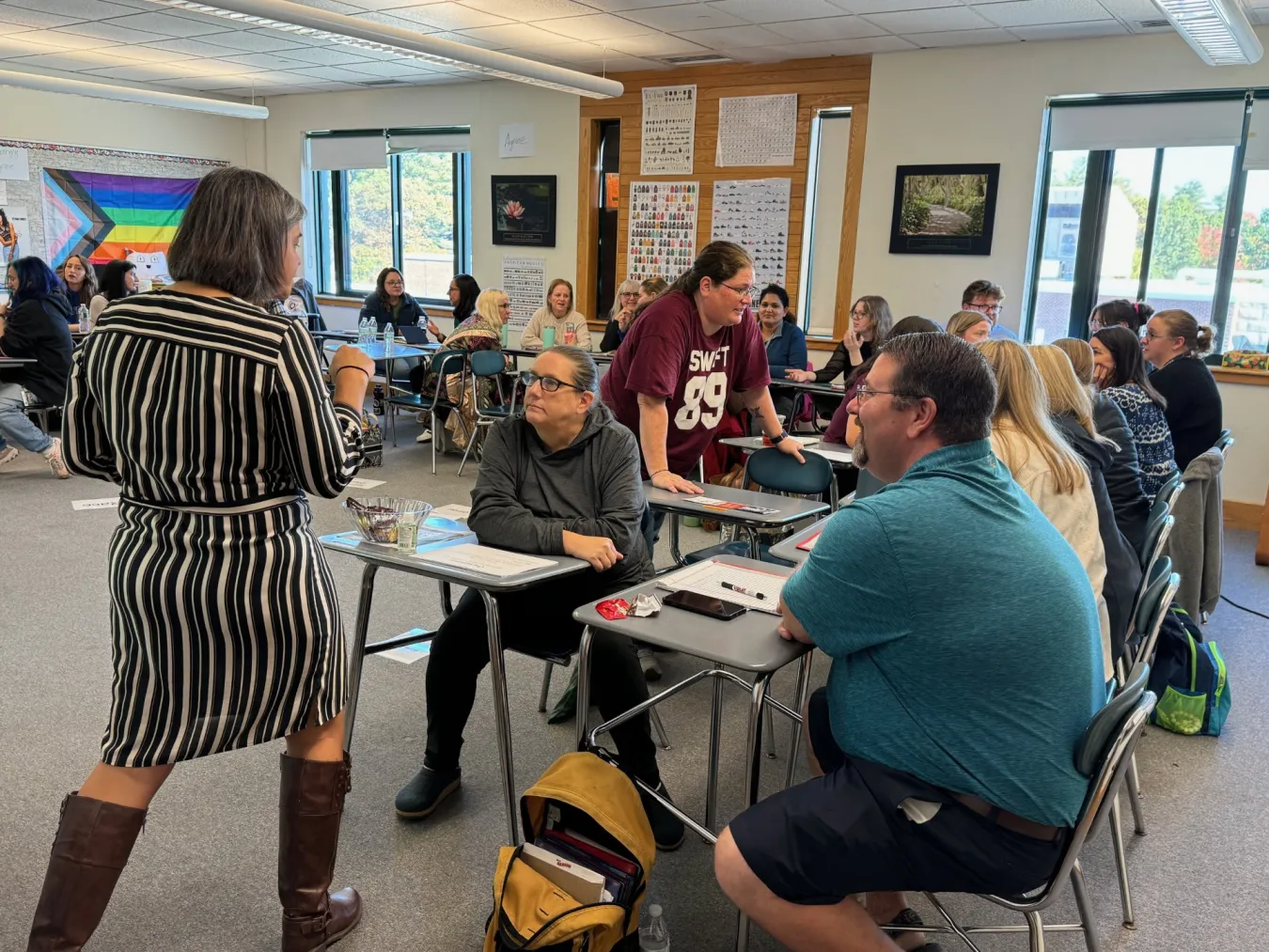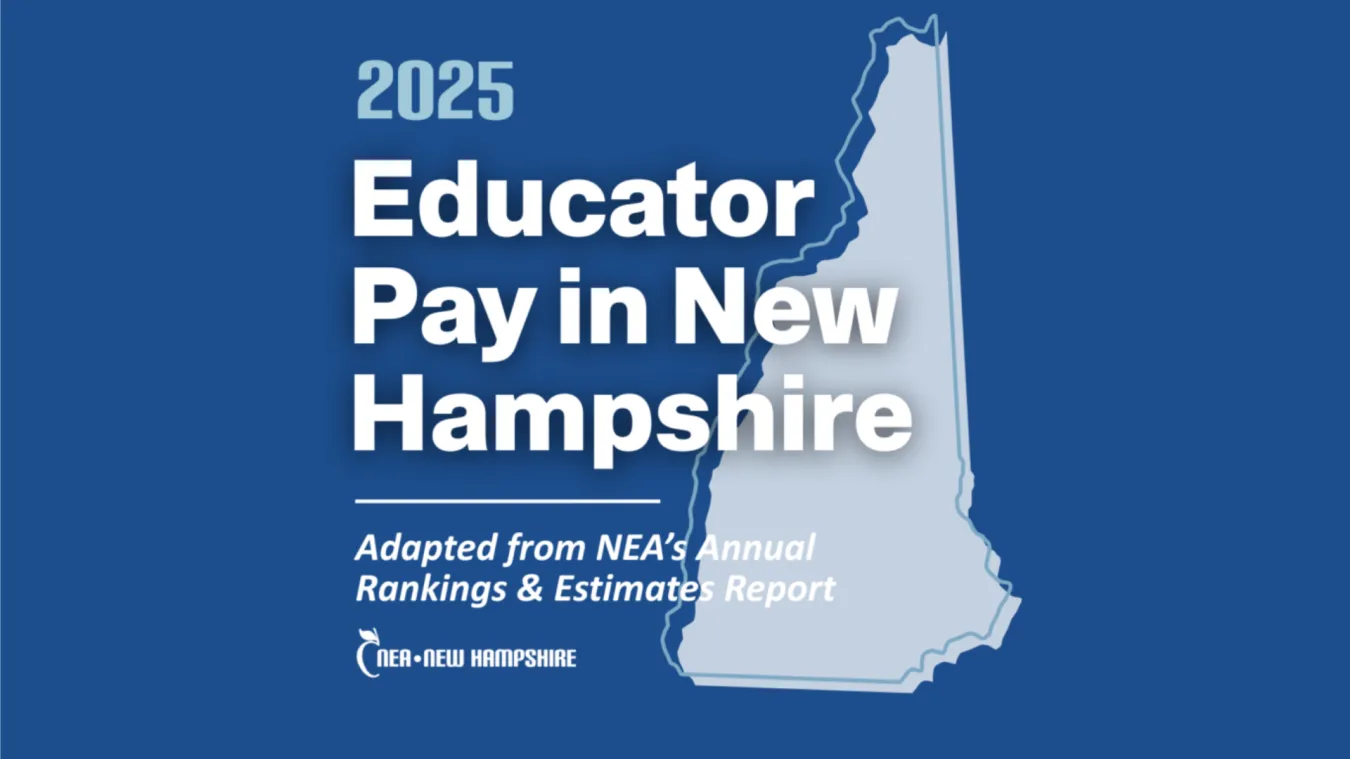

A Great Public School for Every Student
We are New Hampshire's largest educator union; together our voice is stronger as we advocate for our students, our schools, our communities, and our profession.
Get the Latest on
01/31/26: NEA-NH Legislative Update - Mandatory Open Enrollment Moves Forward

01/31/26: NEA-NH Legislative Update - Mandatory Open Enrollment Moves Forward
It's another busy week at the New Hampshire State House - read the NEA-NH Legislative Update for the scoop on how to take action!
How NEA–NH Membership Helped Amherst Educators Reach a Fair Agreement

How NEA–NH Membership Helped Amherst Educators Reach a Fair Agreement
Stable schools depend on stable educators. When teachers have a fair contract, their focus can remain where it belongs—on students, collaboration, and working to implement district goals. Here's the story of how Amherst educators reached a fair agreement.
PRESS RELEASE: NEA-NH Statement on House Education Committee Chair's Signal Chat 'Segregated Schools' Message
PRESS RELEASE: NEA-NH Statement on House Education Committee Chair's Signal Chat 'Segregated Schools' Message
Recently, it was reported that the New Hampshire House Education Committee Chair sent messages through a Signal chat group advocating for 'segregated schools'.
In 2026, NEA-NH Continues Commitment to Elevate Educator Voices and Values at the State House

In 2026, NEA-NH Continues Commitment to Elevate Educator Voices and Values at the State House
As the state’s largest educator union, NEA-New Hampshire is committed to elevating your voices and values at the State House as lawmakers consider legislation that would impact your profession and public education broadly.
New & Aspiring Educator Conference on Zoom

New & Aspiring Educator Conference on Zoom
NEA-New Hampshire invites new and aspiring teachers and their education colleagues to join us for a professional learning conference on Zoom.
New data shows New Hampshire 50th in the nation for state public education funding; some gains in educator pay, but profession is still undervalued and underpaid

New data shows New Hampshire 50th in the nation for state public education funding; some gains in educator pay, but profession is still undervalued and underpaid
National Education Association releases four reports detailing the state of education funding and pay for educators in New Hampshire and around the country
Our best hope for student success IS YOU.
Your passion and commitment are crucial to helping all students—of all colors and backgrounds—learn, grow, and fulfill their potential. Here’s how you can get started.


Achieve professional excellence

Advocate for Your Rights & Working Conditions

Advance justice with us
Your Union. Your Voice.
We are THE voice for educators in New Hampshire. Learn more and get involved with your union!
Let’s BRING REAL CHANGE
Let’s GET REAL
1 in 5 children lack consistent access to meals at home.
Let’s BRING REAL CHANGE

The Community Eligibility Provision of the Healthy, Hunger-Free Kids Act eliminates student hunger at school. Some politicians want to end it, but we can build a future where every child is fed, focused, and free to learn.
Learn what's at stake for students & communities
38 million children receive health care coverage through Medicaid and the Children’s Health Insurance Program
Let’s BRING REAL CHANGE

Congress is considering cuts to Medicaid that threaten the healthcare that tens of millions of families rely on to cut taxes for the wealthy, but educators are speaking out about the importance of Medicaid funding to our families, schools, and communities.
Learn more about how educators are speaking out
What’s on Your Mind?
We’re here to help. Our union has the tools we need (guides, reports, trainings, and more) to help answer everyday questions. Together, we can support each other in whatever we need.
- Collective Bargaining
- College Affordability
- Diversity & Inclusion
- Education Funding
- Gun Violence
- High Poverty Schools
- Immigration
- Legislation
- Mental Health
- Multi-Lingual Learners
- Politics & Campaigns
- Privatization
- Racial & Social Justice
- School Climate
- Special Education
- Trauma
- Voting Rights
- Workplace Conditions

"Students with disabilities weren't educated in most cases."
In 1975, Congress passed what is now known as the Individuals with Disabilities Education Act (IDEA), requiring schools to provide equal access to education for all students with disabilities. The landmark law ushered in an era of inclusion and equity. The current assault on public schools could unravel that progress, leaving students without the support they need.
A society made stronger through world class public education
NEA-NH believes every student, regardless of family income or place of residence, deserves a quality education. In pursuing our mission, we will focus the energy and resources of our 17,000 members on improving the quality of teaching, increasing student achievement and making schools safer, better places to learn.
